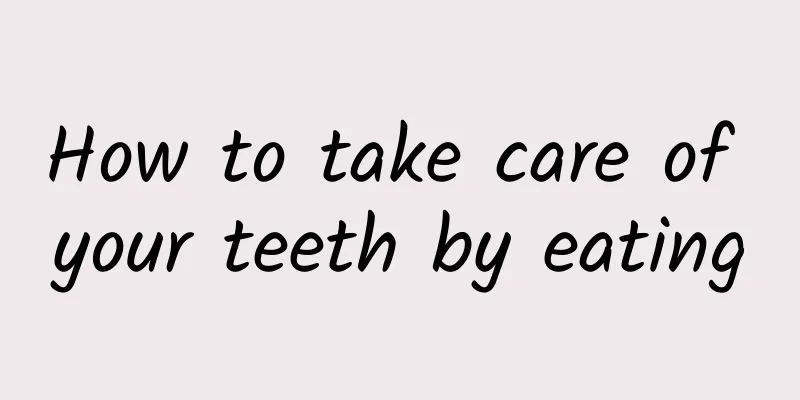How to take care of your teeth by eating

|
Do you have teeth that can eat anything you want, hot, cold, sour, or sweet? Are your teeth, which work hard for us every day and sometimes even have to work overtime, well taken care of? Let's take a look at what to eat to protect your teeth. Celery: A plant-based toothbrush Celery, purple cabbage and other dark green and purple vegetables are the favorite "objects" of teeth. These vegetables contain more dietary fiber, and when chewed, they have a crispy taste. They clean the teeth through friction with the tooth surface, and can be called "plant toothbrushes." Many people tend to throw the celery leaves into the trash when picking celery, but you are throwing away a lot of dietary fiber. Celery leaves contain more dietary fiber than celery stalks. Now let's learn how to make sesame celery leaves that are appetizing and tooth-protecting: chop the blanched celery leaves, sprinkle with sesame seeds, add a small amount of salt, and drizzle with sesame oil, and you will have a unique taste between your lips and teeth. Milk: Fragrant “Mouthwash” 99% of the calcium in the human body is deposited in bones and teeth. It is very important to take in enough calcium every day to maintain a good set of teeth. Milk and dairy products are rich in calcium, which can inhibit the acid production of oral bacteria. The immunoglobulin in milk can also inhibit the growth of bacteria in the mouth, which plays a certain role in maintaining the oral environment and preventing dental plaque. Foreign studies have shown that drinking unsweetened pure milk every day is good for the development of children's teeth. But be sure to make sure it is original pure fresh milk. For us, it is enough to drink about half a pound of milk every day. Seasoning: Tooth Guard Onions, Sichuan peppercorns, and mint may sound a bit irritating, but these supporting ingredients are good for your teeth. The sulfur compounds in onions are powerful antibacterial ingredients that can kill Streptococcus mutans, which causes caries; Sichuan peppercorns have strong antibacterial activity against oral pathogens; and mint can stimulate the secretion of salivary glands, reduce the adhesion of food on teeth, and inhibit the formation of dental plaque. In addition, common onions, ginger, and garlic can also play a certain role in inhibiting the growth of oral bacteria. Don't forget to add some seasonings when cooking, which can both enhance the flavor and protect your teeth. Warm Tips: Teeth hate sucrose, sour foods and carbonated drinks the most. These foods will damage tooth enamel and promote the formation of caries. Therefore, in our daily life, we must rinse our mouths or brush our teeth after eating foods such as candy, cakes, sweet drinks, chocolate, hawthorn, etc. You can rinse your mouth with warm salt water, which can better clean your mouth. |
<<: I gain three pounds every festive season
>>: These 4 methods will make you love whole grains endlessly!
Recommend
New research findings | Eosinophils may be crucial to the body's intestinal health!
The intestine contains a large number of resident...
CICC talks about bacteria丨Lactobacillus acidophilus
Lactobacillus acidophilus Lactobacillus acidophil...
How to cure bacterial vaginitis
In our lives, many women suffer from gynecologica...
For people with low folic acid levels in their bodies, supplementing 0.8 mg of folic acid daily may reduce the risk of malignant tumors caused by "stress"
"Cancer prevention and treatment, comprehens...
Female IUD removal surgery
When the egg and sperm in a woman's body succ...
Is it OK for my aunt to eat durian?
Durian is a tropical fruit that has the effects o...
What movies will be released on February 14, 2020? What movies will be released on White Valentine's Day in 2020?
As we all know, there are many Valentine's Da...
What should I do if I keep itching down there?
Itching down there is a common phenomenon, especi...
What to do if a pregnant woman has a lump in her breast
Some pregnant mothers find lumps in their breasts...
Is breast augmentation done under general anesthesia?
With the advancement of medical technology, many ...
How can middle-aged women replenish kidney deficiency?
I believe everyone knows that kidneys are more im...
What is the fetal movement like in the fourth month of pregnancy
In the second trimester, the pregnant woman will ...
Causes of yellow vaginal discharge and stomach pain
Leucorrhea is a common way to determine whether a...
What causes women to feel hot?
It is very common for women to suffer from heat i...
Before menstruation, if one dark and one light test is taken, does it mean that you are pregnant?
Some female friends often have irregular menstrua...









